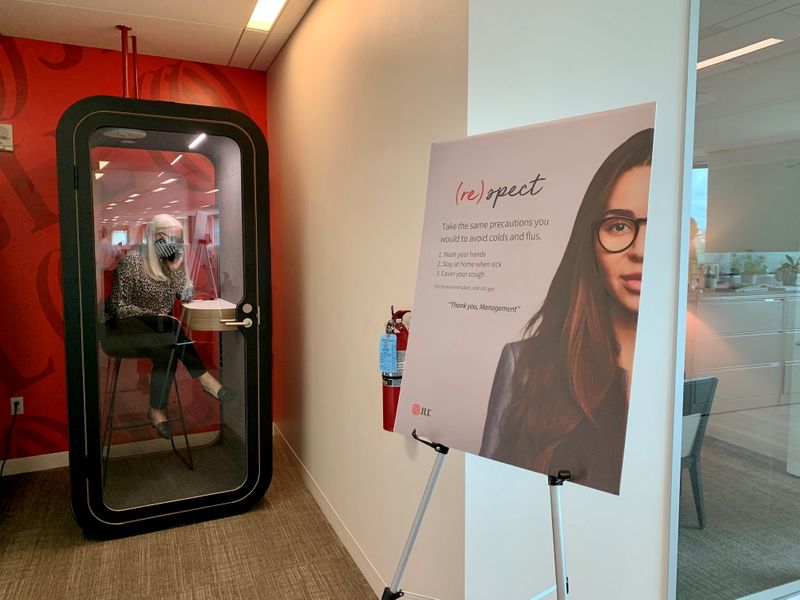By Elizabeth Dilts Marshall
NEW YORK (Reuters) - Reservation systems for seats. Algorithms that say whether a location is crowded or not. Cameras to show what's happening in real-time. Trackers that let others know you are there.
Technology that has swept the world for convenience, curiosity, and accountability is arriving at workstations of U.S. bank employees, as they prepare to return to offices in coming months because of the pandemic easing, industry sources and outside vendors said.
Banks including JPMorgan Chase & Co (NYSE:JPM), Goldman Sachs Group Inc (NYSE:GS), Citigroup (NYSE:C), Deutsche Bank AG (NYSE:DB) and HSBC Holdings (NYSE:HSBC) PLC plan to have workers commute to buildings in New York and other U.S. cities as soon as this month, after more than a year of largely work-from-home situations.
But not everyone can return at once: banks will have to extend practices like those used for small teams of traders during the pandemic. Shifting rotations of people will pass through giant buildings on different days, without clustering in the same areas on the same floors, to avoid spreading COVID-19.
Some of the banks are implementing systems where employees will book "hot seats" on particular days and be monitored while they are sitting at them, sources said.
In some buildings, that could mean cameras that monitor a room's occupancy level and even sensors that tell building management whether someone is sitting at a desk.
"That feels a little personal," one bank employee said about desk sensors.
The comment reflects a sentiment that some banks could face as they bring in tech that monitors employees more closely after an unprecedented period of working from afar: they are okay booking dinner reservations online, sharing locations with friends, live-streaming videos or wearing activity trackers for their own health, but not necessarily okay with having their employers knowing when they are seated at a desk.
Employees will need to get over these hang-ups because the technology is necessary for safety and saves companies money, industry sources and consultants said.
"We have to be more mindful about how space is being used and when it is being used," said Neil Murray, CEO of corporate solutions at JLL, which manages offices for JPMorgan, Morgan Stanley (NYSE:MS), Goldman Sachs and others.
Murray said public health initiatives like contact-tracing have forced us to make certain concessions.
"There is an element of having to watch interactions more closely. At the same we have to be respectful of individual privacy."
JLL would not comment on specific clients, and Reuters could not independently determine which banks were using the technology.
SEARCHING FOR 'OPTIMUM ROTATION'
Staff returning to JPMorgan's Manhattan headquarters will soon have a new app that uses algorithms and artificial intelligence to book seats.
It is part of an "optimum rotation" plan, Daniel Pinto, JPMorgan's co-president and chief operating officer said recently. That means getting the right people together on the right days for in-office collaboration.
HSBC and Deutsche Bank (DE:DBKGn) also plan to launch reservation apps and online systems. While all three banks are still working out the details, apps like these can use card-swipes at security turnstiles to identify patterns and suggest when someone should book a desk to meet teammates.
Some companies in JLL's portfolio are taking it a step further and linking their reservation systems to building cameras, which count bodies in a room, and desk sensors, which record when a seat is occupied, Murray said.
In addition to flagging when a room may be near its 50% capacity limit, the data can tell companies when an office, or whole floor, is empty. That helps determine when to turn off lights, cancel janitorial services or downsize office space.
JPMorgan expects to need just 60 seats for every 100 employees, on average, Chief Executive Jamie Dimon wrote in his April shareholder letter.
"This will significantly reduce our need for real estate," Dimon wrote.
WHAT ABOUT LUNCH?
A not insignificant number of bank employees have resisted going back to work in the office — whether because of COVID-19 concerns, because they moved out of big cities during the pandemic, or because they simply prefer more flexible work arrangements.
On the flip side, some junior investment bankers have complained about working from home without the hands-on guidance and camaraderie they would get in person, and without perks like free meals for late-night duties.
Banks will have to balance those dynamics to get their workforce back to the office, and some are leaning on the idea of free and subsidized food.
Credit Suisse (SIX:CSGN), Barclays (LON:BARC) and others are using Sharebite, which coordinates orders from restaurants and directs delivery drivers to a building's service entrance. Meals are then sent to a common space where employees collect them.

The service has been popular at investment banks looking for contactless food delivery, said Sharebite CEO Dilip Rao.
"When you offer people food it brings people back to the office," Rao said. "They feel safe. They feel fed."